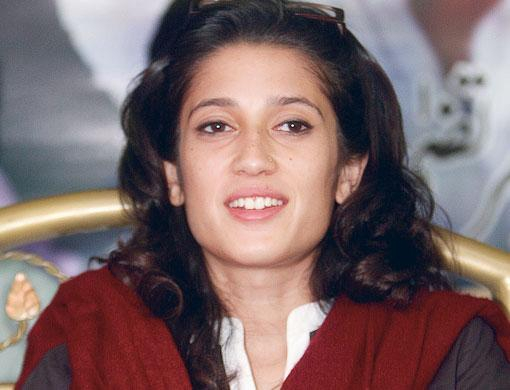
“Writing is always a long journey, no matter the genre. And since fiction was new territory for me, naturally the process was different,” says Fatima Bhutto, who has made her debut as a novelist with “The Shadow of the Crescent Moon”, after having been a nonfiction writer.
Published by Penguin, the novel is set in Mir Ali, a small town in the troubled tribal region of Waziristan, close to the Afghan border. The author wanted the town, the epicentre of the story, to be a combination and reflection of a lot of real locations in Pakistan and “The Shadow of the Crescent Moon” draws stories and experiences from real life.
Bhutto, granddaughter of Zulfikar Ali Bhutto, former prime minister of Pakistan, informs, “When I was a journalist, I had travelled a lot. All the things that did not fit into articles, all the little moments you have with people, those stayed with me. The surge in this book came from that period of journeys. The scenery or the descriptions come from what I saw. So, even though it is fiction, ‘The Shadow of the Crescent Moon’ is not a fake story.”
She considers it important to look at the places in the book through people, and elaborates, “It is a novel about how we love in different ways, because in environments that are not stable, one has to learn to love and live in different ways.”
During her recent visit to India for the launch of her novel, she said that her purpose was, “meeting young readers and learning more about the country through her travels and conversations with people”.
The characters in “The Shadow of the Crescent Moon” are young and the novel conveys how war affects the imagination of youth. Dealing with the issues facing Pakistan, the politico-religious thriller tells the story of three brothers Aman, Sikandar and Hayat, and two women, Samarra and Mina, with elements of Taliban and drone attacks.
The brothers live in a white house, which they share with their widowed mother. They meet for breakfast at their house and soon after, the eldest Aman, recently returned from America, hails a taxi to the local mosque. The second brother Sikandar, a doctor, goes to check in at his hospital. His troubled wife Mina does not join the family that morning for no one knows where she goes these days. And the youngest, Hayat, the idealist, leaves for town on a motorbike. Seated behind him is beautiful Samarra, whose world has been overwhelmed by war.
Three hours later, their day ends in devastating circumstances.
Bhutto captures suffering and injustice through the lives of the women, who fight an everyday battle where they are the victims of a bad system. She states that the women in her book break stereotypes of the image of Pakistani women and chronicle the sufferings they are put through by fundamentalists, the state, the society and their men.
“The women, as much as they have suffered violence at different phases of their lives, are strong and independent-minded. They use their voice regardless of the consequence,” Bhutto maintains.
The author felt that the media had created a particular image of Pakistani women and people started to assume they are reserved, quiet and compliant. But, she says, she does not know any such women in Pakistan.
“On the contrary, they are very powerful in their own ways and have so many shades between them. The women I grew up with are all survivors and it takes something extraordinary to survive in a country such as Pakistan. And both Samarra and Mina (the characters in the novel) are very real to me. They are not fictional at all and share a strong spirit and an unwillingness to be absorbed by their environment,” she emphasises.
Explaining further, Bhutto says, “It was the women who developed and became stronger and more overwhelming as I kept writing. I had a vague idea of what I wanted from each brother, but the women took over. They were the surprise to me.
“At the beginning Mina was a very frustrating character, but her strength comes out later. She seems fragile in a way but she is not. Samarra is wonderful because she is so principled and so pure, but it is also what makes her impossible. There is no way around what she wants and what she believes in.”
Discussing the characters, the writer added that she felt protective of them in a way that she never thought it was possible to feel about made-up people. “Even though I wrote a very personal nonfiction book, this one for me was, in many ways, more personal.”
Writing apart, Bhutto in real life stands up for many causes. She says, “Women’s issues, children and medical care are very close to my heart. In any way that I can help with these issues, I do. In Pakistan, I am in touch with the women’s prisons and try to help them out when they need it and the same is with Afghan refugees in my hometown Karachi. But there is so much work to do that it is impossible to list all that needs to be done. I think being connected and engaged citizens means that we volunteer whenever and wherever it is required.”
Coming from an illustrious background, has it been easy for her as a writer or did she go through her share of rejections by publishers? Bhutto responds: “A writer’s life, like anyone else’s, comes with its fair share of isolation, struggle and rejection no matter who you are. And that is a good thing!”
The pretty-looking author was rumoured to have turned down a role in a big-budget Bollywood film. When asked, Bhutto laughed, “That is one of the funniest stories. But it is patently and spectacularly untrue.”
At the same time, she has been repeatedly questioned about her political nurturing. Resisting the pressure to join politics, Bhutto upholds that her work was best through words and that power was a dangerous and overwhelming force.
“The Shadow of the Crescent Moon” is Bhutto’s fourth book. Her earlier works are: “Whispers of the Desert”, a volume of poetry which was published in 1997 by Oxford University Press, Pakistan when she was 15 years old; “8.50 am. October 8, 2005”, a collection of first-hand accounts from survivors of the earthquake in Pakistan; and “Songs of Blood and Sword”, a memoir on the life of her father, Mir Murtaza, who was murdered when she was just 14.
For Bhutto, it was a sad and painful journey to write “Songs of Blood and Sword”. “It was very difficult for me as a daughter to have to relive his death,” she admits, “but it was also beautiful because through the process of my research I met old teachers and friends of his and got to see my father as a young man, as a new father and as a child. It was a chance to celebrate his life as well as to investigate his murder.”
Bhutto maintains her aunt, Benazir Bhutto, who was the 11th prime minister of Pakistan and assassinated in 2007 in Rawalpindi, had conspired to kill her father. She had publicly accused her aunt of ordering her father’s murder.
Bhutto was born in Kabul in 1982.
The police killed her father, an elected Member of Parliament and son of Pakistan’s former president and prime minister Zulfikar Ali Bhutto, in 1996 in Karachi during the premiership of his sister, Benazir Bhutto.
She graduated from Columbia University in 2004, majoring in Middle Eastern Languages and Cultures and from the School of Oriental and African Studies (SOAS) in 2005, with a Masters in South Asian Government and Politics.
An avid reader, she says, “Agha Shahid Ali is one of my favourite poets of all time. Pankaj Mishra is necessary reading and I love V.S. Naipaul’s early nonfiction. But the subcontinent is full of talented writers and Pakistan, India, Sri Lanka and Bangladesh have a rich history, so it is impossible to narrow down the list.”
But now that her prose is getting popular, will it mean a full stop to poetry writing? She says, “I do not think one can plan to stop or start anything. I have always been open to all kinds of writing and love reading poetry and would never close the door on it.”
Nilima Pathak is a New Delhi-based journalist.











